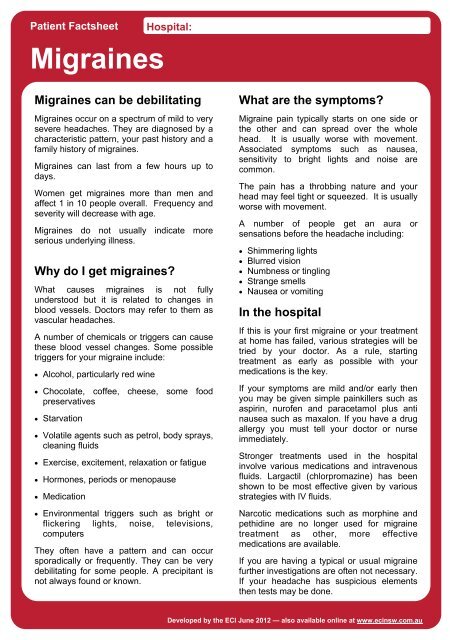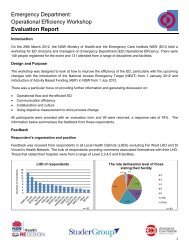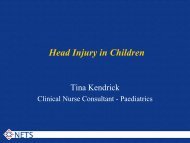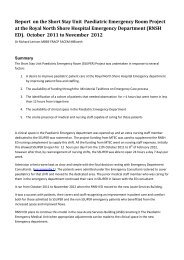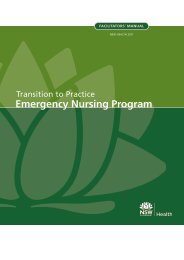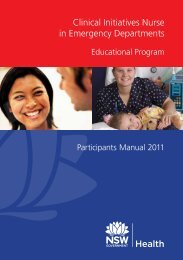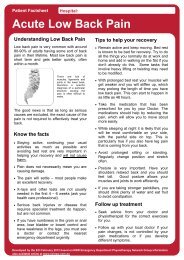Migraines
Migraines
Migraines
You also want an ePaper? Increase the reach of your titles
YUMPU automatically turns print PDFs into web optimized ePapers that Google loves.
Patient FactsheetHospital:<strong>Migraines</strong><strong>Migraines</strong> can be debilitating<strong>Migraines</strong> occur on a spectrum of mild to verysevere headaches. They are diagnosed by acharacteristic pattern, your past history and afamily history of migraines.<strong>Migraines</strong> can last from a few hours up todays.Women get migraines more than men andaffect 1 in 10 people overall. Frequency andseverity will decrease with age.<strong>Migraines</strong> do not usually indicate moreserious underlying illness.Why do I get migraines?What causes migraines is not fullyunderstood but it is related to changes inblood vessels. Doctors may refer to them asvascular headaches.A number of chemicals or triggers can causethese blood vessel changes. Some possibletriggers for your migraine include: Alcohol, particularly red wine Chocolate, coffee, cheese, some foodpreservatives Starvation Volatile agents such as petrol, body sprays,cleaning fluids Exercise, excitement, relaxation or fatigue Hormones, periods or menopause Medication Environmental triggers such as bright orflickering lights, noise, televisions,computersThey often have a pattern and can occursporadically or frequently. They can be verydebilitating for some people. A precipitant isnot always found or known.What are the symptoms?Migraine pain typically starts on one side orthe other and can spread over the wholehead. It is usually worse with movement.Associated symptoms such as nausea,sensitivity to bright lights and noise arecommon.The pain has a throbbing nature and yourhead may feel tight or squeezed. It is usuallyworse with movement.A number of people get an aura orsensations before the headache including: Shimmering lights Blurred vision Numbness or tingling Strange smells Nausea or vomitingIn the hospitalIf this is your first migraine or your treatmentat home has failed, various strategies will betried by your doctor. As a rule, startingtreatment as early as possible with yourmedications is the key.If your symptoms are mild and/or early thenyou may be given simple painkillers such asaspirin, nurofen and paracetamol plus antinausea such as maxalon. If you have a drugallergy you must tell your doctor or nurseimmediately.Stronger treatments used in the hospitalinvolve various medications and intravenousfluids. Largactil (chlorpromazine) has beenshown to be most effective given by variousstrategies with IV fluids.Narcotic medications such as morphine andpethidine are no longer used for migrainetreatment as other, more effectivemedications are available.If you are having a typical or usual migrainefurther investigations are often not necessary.If your headache has suspicious elementsthen tests may be done.Developed by the ECI June 2012 — also available online at www.ecinsw.com.au
Patient Factsheet<strong>Migraines</strong>If you get another migraineTake any medication you have beenprescribed straight away as it will work best iftaken early.If you don’t have mediation prescribed youshould take paracetamol (2 tablets for anadult) and nurofen (400mg for an adult). Youshould: Stop work Lie down in a dark room Don’t read a book or watch the television Avoid stimulation Avoid alcohol, tea, coffee, orange juiceand foods such as chocolate, cheese.Are they doing me harm?Most migraines are treated by patientsthemselves at home and resolve completely.Even severe migraines do not causepermanent damage. They can havesignificant impact on your life though and ifthat is the case you should seek help from aspecialist which your GP can you refer youto.Note: If possible identify what precipitatesyour migraine and try and avoid it, usemedications early if you are going to do thisand speak to your doctor if your headache isdifferent.Instructions:When should I worry? If you have any weakness or feel faint thenyou should consult your doctor or call anambulance If your headache was sudden in onset orout of the blue then you should go to theEmergency Department immediately If your headache is very different from yourusual migraine then you should consultyour doctor If you have persistent strange feelingsother than your usual aura then consultyour doctor Any significant symptom may be as a resultof your migraine but could indicatesomething serious. If you are not sure, askyour doctor.Seeking help:In a medical emergency go to yournearest emergency department or call000.Disclaimer: This health information is for general education purposes only. Always consult with your doctor or other healthprofessional to make sure this information is right for you.


